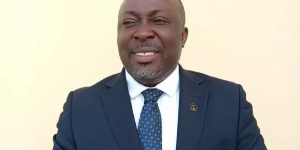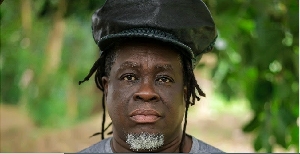HOW COMMON IS A COMMON LANGUAGE?
BY DR. SAMUEL ADJEI SARFO
Let me begin this part of the essay by stating that there is no valid taxonomy based solely on common language, and that the identification of tribal affiliation in Ghana on the basis of common language is a palpable misconstruction of the concept and meaning of tribe. But more specifically, let me push your button further by stating categorically that the expression “common language” by itself is a fictional categorization, since language is a very organic phenomenon, variegated by strong historical, social, academic and professional experience.
Let me ask you this simple question: Did Shakespeare write in English? Most people will reflexively answer “yes” and go ahead to quote some of the plays they have read to prove their point. But scholars in Literature and Linguistics will tell you that there is such a radical difference among Old, Middle and Modern Englishes, and that they are so mutually unintelligible to the extent where they could be aptly construed as three separate and distinct languages. So was Shakespeare English? If all that we are looking for is his language to define him, then he is not, since the most proficient English speaker cannot understand his original writings. Thus, because of the historical evolution of languages, any taxonomy based only on a common language is nebulous.
The same applies to social class variation in the way we speak our language. Put simply, as a result of our in interaction in our society and the outside world, the way we speak our own mother tongue varies from small differentials to very radical ones. I spent a lot of time to study Asante Twi in order to become proficient, and when I go home to Ghana, many people wonder at my flawless language, and even say that I speak Twi as someone who has never travelled outside the country-not a smidgen of English spice. And how do people who travel outside the country speak their mother tongue? Well, it varies from their accent to vocabulary to grammar, and is often spiced with enough foreign words to make their language a new dialect altogether. Therefore they are different linguistic animals from their native interlocutors, and to mix them with the original speakers of the language for purposes of classification is patently wrong. These people also have no idea about a single custom of their people, do not know or care about their chieftain nor do they have any knowledge about their traditions and culture. And yet people want to believe that they belong to the same language group with these strangers, and will impute the same quantum of fallacious myths and hatred to so-called members of another group with whom they actually share more in common.
And consider further the effects of academic studies on language. It throws languaget totally out of gear! Every one of us, including native speakers of English, will speak or write the language differently depending on our level of education. Thus viewed in this strict context, language is not a natural phenomenon but a sociological construct, refined or defined by one’s academic status.
Language also varies by one’s profession. For example, the cant and jargon applied by the medical profession, although written in English, cannot be understood by the native speakers merely by dint of the fact that they are native speakers. They have to learn it as though it were another language. When I was in law school, I was reviewing an autopsy report for a murder trial in my Trial Simulation class. In spite of my two degrees in English, I could simply not understand anything! The document was complete Greek to me, and so it was to my professor and many of my friends. How could a document be written in English and yet evade understanding to even the specialists in the language? Well, one could say that it was in a different language altogether based on the preparer’s profession. How can we group this speaker together with the other users of the language under one category? Thus it is a fictional proposition to say that a professional has the same common language as those in a certain language group. Remember that many Asantes claim to belong to the Asante group although they have absolutely nothing in common with their fellow Asantes elsewhere. There is virtually no similarity and ( I daresay basic knowledge ) of the Asanté language, they have no knowledge of a single Asante culture, tradition or custom. They have no knowledge about Asante marital customs, its rights of genetricem, forms of inheritance…….absolutely nothing about traditional Asante culture. And this lack of knowledge is across board. Indeed, if anybody were to be defined by their knowledge of their language, culture and traditions, there will be few Asante, Ewe, Gurusi or Frafra. Which so-called Asante speaks the language better than Ephraim Amo, Kofi Awoonor, Ben Abdallah? And who speaks Ewe worse than JJ Rawlings? If you think the man’s Twi is horrible, remember that his Ewe is worse, only that he might be slightly better in Ga. So is he an Ewe, Ga or Asante? And why? Let me rephrase the question….Exactly what is the common linkage, if any, among all Asantes or Ewes or Frafras or whatever? I have posited that it is not language because many in the group can’t even speak their language, let alone write it. I have posited that it is not custom because a majority of the group members are simply clueless about their custom. I have posited that it is not a geographical confinement because we are all spread throughout the country. I have posited that it is not the chief because many have never seen their chief nor know his name. I have posited that many do not know their clans, their culture …… anything about their groups or their history. Ladies and gentlemen, I now posit that the concept of common language is completely a fictional characterization and cannot be sustained upon strict taxonomy…. There is no language group in Ghana!!! You think you are an Asante because that is what you have been made to believe… and how easily do we believe!
We believe in the fictional accounts of people who lived thousands of years ago and apply their superstitious stories to our lives today. We have allowed the politicians to brace our thoughts with preconceived notions and ideological posturing. We believe in juju money without asking why our country sources outsides loans if there is anything like juju money to be conjured from the spirit world. We believe in poltergeists, sucubi, incubi, goblins, mermaids, unicorns, witches, wizards, demons, angels, gods…….
Once, I was watching the great football legend, Rev. Osei Kofi on Ghana TV. The question was put to him, “Wo dwen se biribi wo wiase?” To wit, do you think there are spirits running our world? He answered “yes” and his support was that once, when he was seven years old, he and his mentor were walking in his neighborhood. They met an old woman, and his mentor asked him to kick some sand on to her feet. When he did so, the old woman cried, ”Oh my grandson, why have you kicked sand into my eyes?” Thereafter, his mentor explained that the woman was actually walking on her head in the spirit world; that is why he complained of sand in her eyes instead of her feet. This made him believe that the spiritual world does indeed exist. My shock was how a piece of brain can remain unchanged for almost seventy years, wrapped around such an odious experiment! Yet, that is the case with many of us. We were taught something in childhood, and yet nothing changed in adulthood. The uniqueness of our thinking is that it is built on unflinching faith acquired in infancy, not on reasoning learned through our education.
Let me end by quoting a Physics Professor at KNUST who always begins his Physics lectures to freshmen by saying, “I am a Christian, and so I don’t believe in anything I teach here that will be contrary to my Bible, but I am paid to teach you all this blasphemy, and so I shall.”
I have made a contentious proposition here, and that is that the expression “common language” by itself is a fictional categorization, since language is a very organic phenomenon, variable by strong historical, social, academic and professional experience. We must respond intellectually without behaving like Rev. Osei Kofi, or the estranged Physics Professor at KNUST.
Samuel Adjei Sarfo, Juris Doctor, lives in Austin, Texas. You can reach him at sarfoadjei@yahoo.com
Opinions of Monday, 26 September 2011
Columnist: Sarfo, Samuel Adjei














